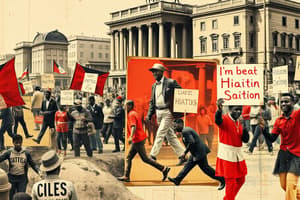Podcast
Questions and Answers
What is the Devshirme system?
What is the Devshirme system?
- A type of art in Ottoman Empire
- A method for collecting taxes
- An agricultural practice
- The system by which boys from Christian communities were taken by the Ottoman state to serve in the military and government (correct)
What role did Samurai play in Japan?
What role did Samurai play in Japan?
They served each daimyo, were paid salaries, and held economic power.
The Divine Right belief allowed kings of England to rule without any restrictions.
The Divine Right belief allowed kings of England to rule without any restrictions.
True (A)
What is a Mosque?
What is a Mosque?
What were the responsibilities of a Zamindar in the Mughal Empire?
What were the responsibilities of a Zamindar in the Mughal Empire?
A tribute is a payment by one individual or nation to another, usually involving money or ______.
A tribute is a payment by one individual or nation to another, usually involving money or ______.
What is a Schism?
What is a Schism?
What distinguishes Sunni Islam from Shi'a Islam?
What distinguishes Sunni Islam from Shi'a Islam?
What is the focus of Shi'a Islam?
What is the focus of Shi'a Islam?
What does 'Transoceanic' refer to?
What does 'Transoceanic' refer to?
Flashcards are hidden until you start studying
Study Notes
Devshirme
- System employed by the Ottoman Empire to recruit boys from Christian communities for military and government service.
- Boys often became Janissaries, elite soldiers, enhancing the state's military capacity.
- Integral to the administrative structure of the Ottoman government, improving efficiency.
Samurai
- Warriors in Japan serving individual daimyo, wielding both military and economic power.
- Paid a salary and held influential societal status, contributing significantly to regional governance.
- Provided strength and stability, essential for the power dynamics among daimyo.
Divine Right
- Concept in England that monarchs derive their right to rule from God.
- Enabled kings to act with authority in both political and religious matters.
- Played a crucial role in shaping English monarchy during the Middle Ages, consolidating royal power.
Mosque
- Places of worship for Muslims, often resembling architectural and cultural landmarks.
- Significant mosques were constructed during the reign of Suleiman I, symbolizing economic prosperity.
- Served to legitimize the power of rulers through grand structures that reflected the wealth of their cities.
Zamindar
- Officials in the Mughal Empire responsible for taxing, construction, and maintaining water supplies.
- Received land grants as compensation, allowing them to retain a portion of taxes collected from peasants.
- Kept the Mughal administration stable and later built personal armies for increased local control.
Tribute
- Payments made by individuals or nations to assert dominance, often in the form of money or valuable goods.
- Served as a demonstration of power, establishing hierarchies between states.
- Empires like Korea and the Aztec used tributary systems, reinforcing power dynamics across regions.
Schism
- A division within a group, notably associated with the Great Schism between Eastern Orthodox and Roman Catholic Churches.
- Created significant strain in religious relations, leading to lasting separations and conflicts.
- Other instances, like the split between Sunni and Shi'a Islam, emphasized differing interpretations and led to tensions among empires.
Sunni
- A major branch of Islam that rivals Shi’a Islam, emphasizing God's influence in worldly matters.
- Predominant branch in the Ottoman Empire, resulting in conflicts with Shi’a opponents.
- Historical tensions contributed to modern disputes, particularly between Iran and Iraq.
Shi'a
- The branch of Islam that contrasts with Sunni beliefs, highlighting themes of martyrdom and sacrifice.
- Primarily followed by the Safavid Empire, which used Shi'a ideology for political unity.
- Resulted in numerous conflicts with Sunni-dominated powers, notably the Ottomans.
Transoceanic
- Refers to activities involving the crossing of oceans, especially trade and exploration.
- Facilitated cultural exchanges and the spread of traditions across continents.
- European ventures aimed at new lands sparked the creation of a transoceanic network, impacting global trade and leading to the establishment of colonies in the Americas.
Studying That Suits You
Use AI to generate personalized quizzes and flashcards to suit your learning preferences.




